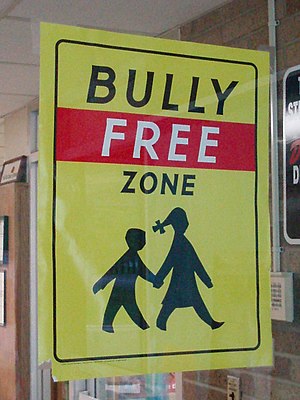Healthy Weight – It’s a Family Reunion!
September 4, 2012Get Down with Being an Upstander!
October 2, 2012 Bullying is defined as a form of aggressive behavior manifested by the use of force or coercion to affect others, particularly when the behavior is habitual and involves an imbalance of power. It may be directed repeatedly towards particular victims (also called “targets”), typically on grounds of race, religion, gender, ability or sexuality. Although bullying can be defined in many ways, there are four basic types of abuse – emotional, verbal, physical, and electronic.
Bullying is defined as a form of aggressive behavior manifested by the use of force or coercion to affect others, particularly when the behavior is habitual and involves an imbalance of power. It may be directed repeatedly towards particular victims (also called “targets”), typically on grounds of race, religion, gender, ability or sexuality. Although bullying can be defined in many ways, there are four basic types of abuse – emotional, verbal, physical, and electronic.
The state of Michigan defines bullying in schools as:
“any written, verbal or physical act, or any electronic communication, that is intended or that a reasonable person would know is likely to harm 1 or more pupils either directly or indirectly by doing any of the following:
(i) substantially interfering with educational opportunities, benefits, or programs of 1 or more pupils;
(ii) adversely affecting the ability of a pupil to participate in or benefit from the school district’s or public school’s educational programs or activities by placing the pupil in reasonable fear of physical harm or by causing substantial emotional distress;
(iii) having an actual and substantial detrimental effect on a pupil’s physical or mental health; and
(iv) causing substantial disruption in, or substantial interference with, the orderly operation of the school.
Bullying, also referred to as “peer abuse”, ranges from simple one-on-one bullying to more complex bullying in which the bully may have one or more persons who may be willing to assist in his/her bullying activities. It can occur in any context in which human beings interact with each other – school, church, family, the workplace, home, and in neighborhoods, between social groups, social classes, and even between countries.
One group that is at significant and disproportionate risk of being bullied are lesbian, gay, bisexual, transgender and queer (LGBTQ) youth. Nearly 9 out of 10 LGBTQ students experienced harassment at school in the past year, and 61% felt unsafe because of their sexual orientation.
Fear is responsible for 33% of LGBTQ students skipping school, and 70% of LGBTQ students report that their teachers never step in to stop bullying and harassment. Youth in rural communities face particularly hostile school environments. Because of these stressors and the lack of caring and supportive adults in their lives, LGBTQ youth are 190% more likely to use drugs and alcohol and 4x more likely to attempt suicide than their heterosexual peers! The discrimination and stigma are powerful and generate isolation, feelings of hopelessness and excruciating emotional pain.
No one should be afraid to go to school or to be in public places. Everyone can contribute to creating a safer, more inclusive and more welcoming environment. Here are a few suggestions for ways to improve the school climate for LGBTQ students:
1. Intervene when you see bullying or harassment of any type, but especially when it is related to LGBTQ.
2. Think before you speak. Stop all derogatory language, especially in regards to LGBTQ. Even if the language isn’t intended to be hurtful or is supposed to be “a joke” (such as “that’s so gay” or “don’t be such a fag”), it has negative impact and hurts.
3. Don’t make assumptions, be inclusive and kind to people who are different than you. Everyone wants to feel like they belong.
RAHS has support groups for LGBTQ youth who are being bullied, as well as anti-bullying educational events throughout the school year. Contact your RAHS Clinic to find out when the support groups are meeting.
Author Kathy Diehl, LMSW, is the Social Work Coordinator with the Regional Alliance for Healthy Schools.
Here are some other great resources to promote safe, welcoming, and inclusive school environments in which everyone is respected and valued. Check them out!
www.thinkb4youspeak.com
www.stopbullying.gov
www.gsa.org
www.glsen.org
www.trevorproject.org
sports.glsen.org
www.dosomething.org/bully


